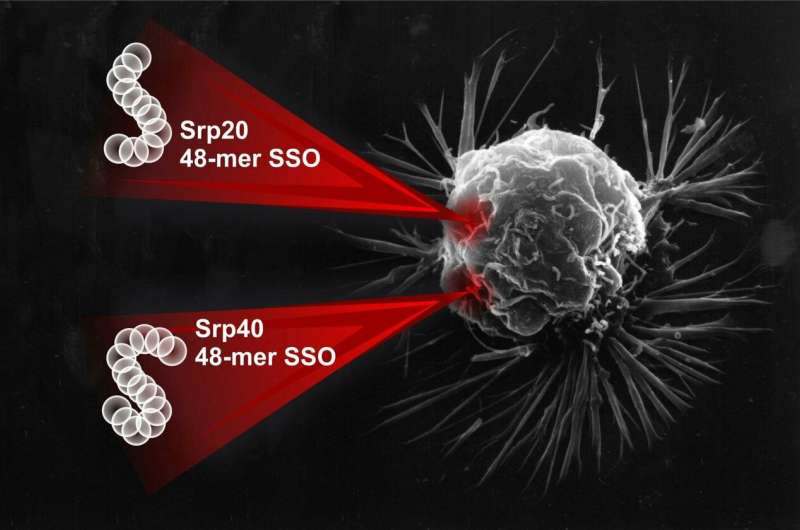Biochemists report a way to stop the immortality of cancer cells with oligonucleotides

RUDN biochemists found a way to reduce the activity of telomerase (the enzyme of cell immortality) 10-fold. The discovery could lead to new antitumor drugs and give a better understanding of how the activity of the enzyme can be controlled. The results of the study were published in the journal Biochemical and Biophysical Research Communications.
The ends of chromosomes are covered with a kind of safety cap called telomeres. These are compact DNA sequences that stabilize the chromatin structure. With each cell division, telomeres become shorter, and the older a cell becomes, the shorter the telomeres of its chromosomes. However, certain types of cells (e.g. germ cells, stem cells, and lymphocytes) have an active immortality enzyme called telomerase. It compensates for the shortening of telomeres and allows the cells to divide practically endlessly. The highest telomerase activity is observed in cancer cells—this is one of the factors that makes them malignant. RUDN biochemists demonstrated that the activity of telomerase may be reduced using specific oligonucleotides (short DNA fragments).
"We wanted to find out whether the oligonucleotides in charge of splicing shift are able to slow down the activity of telomerase (splicing is the process of cutting and reattaching of mRNA segments). We studied it in human T-lymphocytes. As a result, we managed to find an oligonucleotide able to suppress telomerase and slow down cell proliferation without killing the cells," said Dmitry Zhdanov, a co-author of the work, a candidate of biology, and assistant professor of Academician Beryozov Department of Biochemistry at RUDN.
The main way of influencing the activity of telomerase is inducing alternative splicing of its mRNA. As a result of this process, several non-active protein forms are synthesized in a cell. RUDN biochemists affected the alternative splicing using three types of oligonucleotides specific for different regulatory areas of telomerase mRNA. They were injected into human T-lymphocyte cells, and the activity of telomerase was measured after one day. It turned out that individual oligonucleotides did not influence the enzyme considerably, but the combination had a profound effect: the activity of telomerase reduced to 50 percent within the first 24 hours, to 18 percent within the second, and to 10 percent within the third.
According to the biochemists, oligonucleotides may serve as a basis for new drugs for anti-proliferative therapy that us used to treat benign and malignant tumors and other conditions associated with excessive cell division.
More information: Dmitry D. Zhdanov et al, Inhibition of telomerase activity by splice-switching oligonucleotides targeting the mRNA of the telomerase catalytic subunit affects proliferation of human CD4+ T lymphocytes, Biochemical and Biophysical Research Communications (2019). DOI: 10.1016/j.bbrc.2018.12.186
Journal information: Biochemical and Biophysical Research Communications
Provided by RUDN University


















